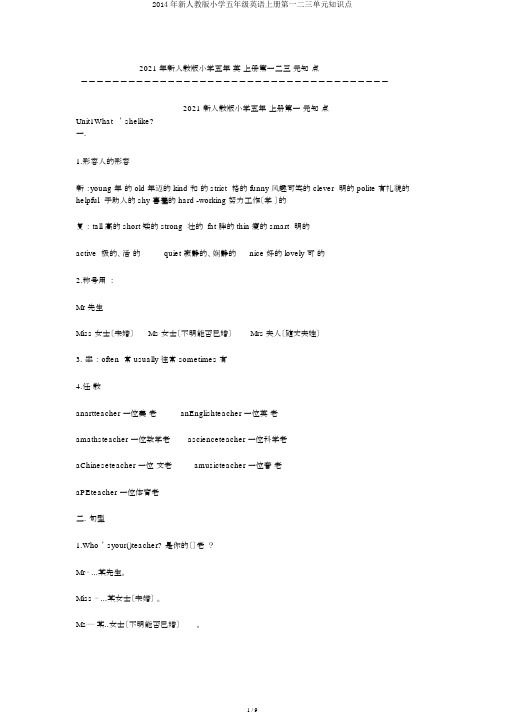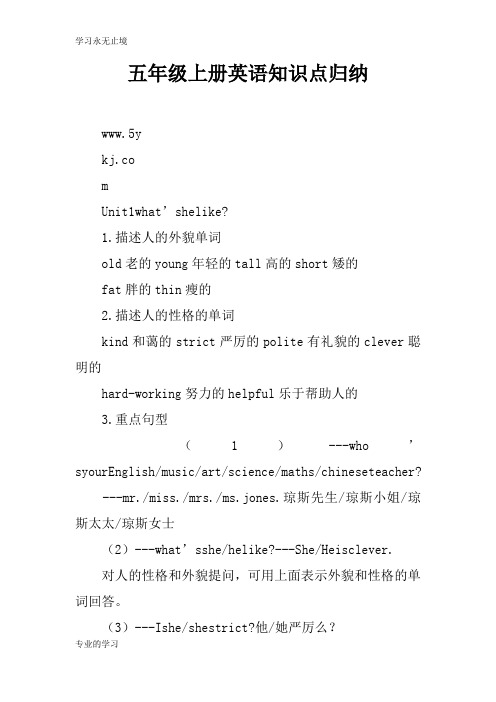2013--2014五年级上册英语知识点归纳
2014年新人教版小学五年级英语上册第一二三单元知识点

2021 年新人教版小学五年英上册第一二三元知点---------------------------------------2021 新人教版小学五年上册第一元知点Unit1What’ shelike?一.1.形容人的形容新:young 年的 old 年迈的 kind 和的 strict 格的 funny 风趣可笑的 clever 明的 polite 有礼貌的helpful 于助人的 shy 害羞的 hard -working 努力工作〔学〕的复: tall 高的 short 矮的 strong 壮的 fat 胖的 thin 瘦的 smart 明的active 极的、活的quiet 寂静的、娴静的nice 好的 lovely 可的2.称号用 :Mr 先生Miss 女士〔未婚〕Ms 女士〔不明能否已婚〕Mrs 夫人〔随丈夫姓〕3.率: often 常 usually 往常 sometimes 有4.任教anartteacher 一位美老anEnglishteacher 一位英老amathsteacher 一位数学老ascienceteacher 一位科学老aChineseteacher 一位文老amusicteacher 一位音老aPEteacher 一位体育老二.句型1.Who ’ syour()teacher?是你的〔〕老?Mr⋯ ...某先生。
Miss ⋯ ...某女士〔未婚〕。
Ms⋯⋯某..女士〔不明能否已婚〕。
Mrs ⋯⋯某.夫人〔随丈夫姓〕。
括号里填科目2.: What’ s()like?某人怎么?括号里可填:〔 she/he/yourfather/yourartteacher/ZhangPeng/MrLi〕答 He/Sheis().括号里填描绘人的形容3.MissWangwillbeournewEnglishteacher. 王女士将会是我的新英老。
4.Isshe/hekind? 她是和的?一定回复Yes, she/heis. 否回复No,she/heisn’ t.5.DoyouknowMrYoung? 你知道先生?一定回复:Yes,Ido. 否回复:No,Idon’ t.三.句型1.Sheiskind.(疑句)Isshekind?2.Mikeisyoung. 〔划局部提〕What’ sMikelike?3.Iknow.( 否句 )Idon ’ tknow.四. be 的用法五.字母 y 在尾音[I]happybabysunnywindysorrymanycandypartyfamily2021 新人教版小学五年上册第二元知点Unit 2 My week一.classschedule 课程表weekendMondayTuesday Wednesday ThursdayFridaySaturdaySundaymorningChineseEnglishChinesemathsChineseChineseEnglishmaths Chinese mathsmathsmaths Chinese mathsmaths moraleducation science Englishartafternoon Chinese ChinesePEsciencePEEnglish Chinesemusicmoraleducationmusicart学校课程mathsChinesemathsmathsmaths二.1.礼拜: Monday 礼拜一 Tuesday 礼拜二 Wednesday 礼拜三 Thursday 礼拜四 Friday 礼拜五Saturday 礼拜六 Sunday 礼拜天 week 一周 weekend 周末 weekday 工作日 day 天2.科目:语文Chinese 数学 maths 英语 English道德与社会moraleducation 科学 science 音乐 music美术 art 计算机课computerclass 体育课 PE烹调课 cookingclass3.schedule 时辰表 classschedule 课程表4.短语: dohomework 造作业 watchTV 看电视 readbooks 念书washmyclothes 洗我的衣服playfootball 踢足球playping-pang 打篮球 playbasketball 打篮球playsports 做运动 playthepipa 弹琵琶drawpictures 画画 learntheroom 打扫房间dohousework 做家务 listentomusic 听音乐二.句型1.Whatdayisittoday? 今日礼拜几? It ’ sTuesday礼拜.二。
2014五年级英语上册1-4单元知识点归纳与练习题

2014五年级英语上册1-4单元知识点归纳与练习题2014五年级英语上册1-4单元知识点归纳与练习题dule1HbbiesUnit1hat’surhbb?一、兴趣爱好的词组:plaputergaes,plausi,lletstaps,eeppets,aedelships,readbs,tae phts,aeaes,planttrees,grflers,studplants,listeningtusi,singing,daning,draing,plathepian,plahess,plabasetball…二、句型:hat’surhbb?2Dulie…?es,Id/N,Idn’t3Ilve/lie…4Ien…5hbbis…6…ishbb7Isurhbbeepingpets?es,it’s/N,itisn’t三、重点精析:lve/lie/endingsth喜欢做某事如:Ilielisteningtusi我喜欢听音乐。
他喜欢集邮。
_____________________________________2hbbisdingsth我的爱好是……如:hbbisreadingbs我的爱好是看书。
我爸爸的爱好是拍照。
___________________________________3rethan…多于……,超过……fr来自于如:Ihavelletedrethan3hundredstapsfr20untries 我已收集了来自二十个国家的300多张邮票。
ane有九十多本英语书。
__________________________________4ever每一的,每个的everda每天evernight每晚everear每年everFrida每周五5during+时间表示在某段时间里duringda在白天duringthesuerhlida在暑假期间6sef+名词……中的一些如:SefthestudentsarefrAeria这些学生中的一些来自美国。
2014广州最新版小学五年级英 语上册1-4课知识点归纳与习题

Module 1 HobbiesUnit 1 What’s your hobby?一、兴趣爱好的词组:play computer games, play music, collect stamps, keep pets, make model ships, read books, take photos, make cakes, plant trees, grow flowers, study plants, listening to music, singing, dancing, drawing, play the piano, play chess, play basketball…二、句型:1. What’s your hobby?2. Do you like…? Yes, I do. / No, I don’t.3. I love/like…4. I enjoy …5. My (favourite) hobby is …6. …is my (favourite) hobby.7. Is your hobby keeping pets? Yes, it’s. / No, it isn’t.三、重点精析:1. love/like/enjoy doing sth 喜欢做某事如:I like listening to music. 我喜欢听音乐。
他喜欢集邮。
_____________________________________2. My hobby is doing sth 我的爱好是……如:My hobby is reading books. 我的爱好是看书。
我爸爸的爱好是拍照。
___________________________________ 3. more than… 多于…… , 超过…… from 来自于如:I have collected more than 3 hundred stamps from 20 countries.我已收集了来自二十个国家的300多张邮票。
人教版五年级英语上册知识点整理

人教版五年级英语上册知识点整理在英语教材中,每个单元都有它所侧重的学问点和内容。
做好英语学问点归纳,可以让我们的英语期末复习更有方向和目标。
下面我为大家带来人教版(五年级英语)上册学问点,盼望大家喜爱!五年级英语上册学问点Unit 1 What’s he like?1. 描述人的外貌单词old 老的young 年轻的tall 高的short 矮的fat 胖的thin 瘦的2. 描述人的性格的单词kind 和气的strict 严峻的polite 有礼貌的clever 聪慧的hard-working 努力的helpful 乐于关心人的3.重点句型(1)---Who’s your English/ music/art/science/maths/Chinese teacher?(谁是你的英语/音乐/美术/科学/数学/语文老师?)---Mr. /Miss./Mrs./Ms. Jones. 琼斯先生/琼斯小姐/琼斯太太/琼斯女士(2)---What’s she/he like? ---She/He is clever.对人的性格和外貌提问,可用上面表示外貌和性格的单词回答。
(3)---Is he/she strict? 他/她严峻么?确定回答Yes, he/ she is. 是,很严峻。
否定回答No, he/ she isn’t. 不,不严峻。
Unit 2 My week1.星期一到星期天首字母要大写。
Monday 星期一(Mon.) Tuesday 星期二(Tues.)Wednesday 星期三(wed.) Thursday 星期四(Thur.)Friday星期五(Fri.) Saturday 星期六(Sat.)Sunday 星期天(Sun.)2.watch TV 看电视do homework 家庭read books 看书wash my clothes洗衣服play football踢(足球)3.本单单元重点学习怎样问星期及怎样回答。
五年级英语上册重要知识点整理1

五年级英语上册重要知识点整理1本文旨在整理五年级英语上册的重要知识点,帮助学生巩固所学内容。
下面将按照不同的主题逐一介绍这些知识点。
一、基础语法1. 动词的时态:一般现在时、现在进行时、一般过去时等。
2. 名词的单复数形式:可数名词与不可数名词的区别以及其复数形式的变化规则。
3. 代词的用法:主格、宾格、形容词性物主代词和名词性物主代词等。
4. 形容词的比较级和最高级:规则变化和不规则变化。
5. 副词的用法:修饰动词、形容词和副词的不同用法。
6. 语序和句型:肯定句、否定句、疑问句的构成及其特点。
7. 介词的用法:表示时间、地点等概念。
二、日常用语1. 问候与介绍:常用的问候语和介绍自己或他人的方式。
2. 时间表达:表达时间的方法,如几点几分、星期几等。
3. 数字的表达:基础数字的读法及其运用,如年龄、电话号码等。
4. 家庭与身体部位:家庭成员的称呼以及身体部位的基本词汇。
5. 学科和学校设施:常见学科的英文表达以及学校设施的词汇。
6. 方位和交通:方向词的使用方法以及交通工具的英文名称。
三、常见词汇1. 食物与饮料:常见食物和饮料的名称,以及与之相关的动词短语。
2. 动物与植物:各类动物和植物的名称,以及其特点和栖息地。
3. 季节和天气:四季的英文表达和常见的天气词汇。
4. 颜色和服装:基础颜色的表达以及不同服装的英文名称。
5. 玩具与游戏:各类玩具和游戏的英文表达,如滑梯、跳绳等。
6. 城市和国家:世界各国和常见城市的英文名称。
四、重要句型1. "What's your name?"和 "How old are you?"等常用句型的应答方式。
2. "What's the time?"的表达以及对时间的回答方式。
3. "Is there a/an...?"和 "Are there any...?"等询问句型及其回答方式。
五年级上册英语知识学习总结要点归纳

五年级上册英语知识点归纳www.5ykj.comUnit1what’shelike?1.描述人的外貌单词old老的young年轻的tall高的short矮的fat胖的thin瘦的2.描述人的性格的单词kind和蔼的strict严厉的polite有礼貌的clever聪明的hard-working努力的helpful乐于帮助人的3.重点句型(1)---who’syourEnglish/music/art/science/maths/chineseteacher?---mr./miss./mrs./ms.jones.琼斯先生/琼斯小姐/琼斯太太/琼斯女士(2)---what’sshe/helike?---She/Heisclever.对人的性格和外貌提问,可用上面表示外貌和性格的单词回答。
(3)---Ishe/shestrict?他/她严厉么?肯定回答yes,he/sheis.是,很严厉。
否定回答No,he/sheisn’t.不,不严厉。
Unit2myweek1.星期一到星期天首字母要大写。
monday星期一(mon.)Tuesday星期二wednesday星期三(wed.)Thursday星期四Friday星期五Saturday星期六Sunday星期天2.watchTV看电视dohomework家庭readbooks看书washmyclothes洗衣服playfootball踢足球3.本单单元重点学习怎样问星期及怎样回答。
今天是星期几?whatdayisittoday?今天是星期一。
It’smonday.4.问星期的某天常干什么事及回答。
你星期六常干什么?whatdoyouoftendoonSaturday?我常做家庭作业.Ioftendohomework.你们星期三常上些什么课?whatdoyouhaveonwednesday?我们上语文、数学和英语.wehavechinesemathandEnglish.3.whataboutyou?那你呢?(用于来问别人同样的问题而又不重复前面的问句。
pep五年级上册英语知识点总结
pep五年级上册英语知识点总结五年级上册的英语学习内容主要包括了单词、语法、阅读、写作等方面。
本篇将对五年级上册的英语知识点进行总结,希望对学生们的学习有所帮助。
一、单词五年级上册的英语单词主要包括了一些常见的日常用语和基本的词汇。
如:family(家庭)、food(食物)、sports(运动)、weather(天气)、clothes(衣服)等。
在学习单词时,学生们需要多加练习,熟练掌握这些单词的拼写和发音。
可以通过听写、背诵等方式来提高单词记忆的效果。
二、语法五年级上册的英语语法内容主要包括了名词、动词、形容词、副词、介词等的基本用法。
在学习名词时,学生要注意名词的单数和复数形式,以及不同名词的所有格的使用。
在学习动词时,学生要了解动词的时态、语态和动词短语的用法。
在学习形容词和副词时,学生要注意形容词和副词的比较级和最高级的变化规则。
在学习介词时,学生要掌握介词的基本用法和常见的短语搭配,如:in front of(在……前面)、next to(靠近)、on theleft/right(在左/右边)等。
三、阅读五年级上册的英语阅读内容主要包括了一些简短的文章和故事。
在阅读时,学生要注意理解文章的大意,掌握关键词和关键句,从中提取出文章的主题和中心思想。
同时,也要注重词汇和句式的积累,以便更好地理解和理解文章内容。
另外,学生要注意培养阅读的习惯,提高阅读速度和理解能力。
四、写作五年级上册的英语写作内容主要包括了书面表达和口头表达两个方面。
在书面表达方面,学生要注意语法和拼写的正确性,同时要注重内容的连贯和条理性。
在口头表达方面,学生要注意语音和语调的准确性,同时要注重表达的流畅和自然性。
综合来看,写作是英语学习的重要组成部分,学生们要重视英语写作的训练和提高。
总之,五年级上册的英语知识点涵盖了单词、语法、阅读、写作等多个方面。
学生们在学习英语时,要注重单词记忆和语法练习,多加积累词汇和语法知识,提高阅读和写作能力。
五年级英语上册知识点汇总已整理
五年级上册学问汇总Unit 1一.四会单词:young年轻funny滑稽可笑tall高 strong强壮kind亲善,亲切old年老 short矮 thin瘦Mr先生like像、喜爱principal校长 university student高校生strict 严格smart聪慧、奇妙active主动、活泼very 很、特别but但是quiet宁静;文雅who’s = who is what’s = what is he’s = he is she’s = she is二. 句子:1.A:Who’s your English teacher 你英语老师是谁?B:Mr Carter. 卡特先生.2. He’s from Canada. 他来自加拿大。
网3. A:What’s he like 他什么样?B: He’s tall and strong . 他又高又壮。
He’s very funny. 他很滑稽。
(Who,What引导特别疑问句,用来对不熟识老师进展问答:Who's + 某人?What's he / she like He / She is + 与身体特征和性格特征有关形容词。
)4.A: Who’s that young lady/ 那个年轻女士是谁?B:She’s our principal.她是我们校长。
5.I have a new math teacher. 我有一位新数学老师。
6.Her class is so much fun. 她课特别好玩。
7.She’s a university student. 她是一名高校生。
8. A: Is she quiet 她很宁静吗?B: No, she isn’t. She’s very active. 不是。
她很活泼。
( Is引导一般疑问句,议论某位老师是否具有某方面特征:Is he / she + 与身体特征和性格特征有关形容词,答复用:Yes, he / she is. No, he / she isn't. ) 9. A:Is she strict 她很严格么?B:Yes, she is , but she’s very kind . 是,但她很亲善。
五年级英语上册知识点总结
五年级英语上册知识点总结In the fifth grade English curriculum, students learn a variety of important language skills and knowledge. Here are some key points covered in the first half of the school year:1. Reading Comprehension: Students continue to develop their reading comprehension skills by learning how toidentify main ideas, supporting details, and making inferences. They are also introduced to different types of texts, such as fiction, non-fiction, poetry, and drama.2. Vocabulary Building: Fifth graders expand their vocabulary by learning new words and their meanings. They also learn how to use context clues to figure out the meanings of unfamiliar words.3. Grammar: Students review and learn new grammar concepts including parts of speech (nouns, pronouns, verbs,adjectives, adverbs, conjunctions, and prepositions),subject-verb agreement, verb tenses, and sentence structure.4. Writing: Writing skills are further developed through practicing various forms of writing, such as narratives, descriptions, letters, and reports. Students learn to organize their ideas, use transitional words, and revise and edit their work for clarity and coherence.5. Spelling and Phonics: Fifth graders continue to improve their spelling and phonics skills by learning different spelling patterns, common prefixes and suffixes, and rules for syllabication.6. Speaking and Listening: Students participate in various speaking and listening activities to improve their communication skills, such as giving presentations, asking and answering questions, and engaging in discussions.7. Language Arts: Students explore different literary genres, analyze characters and plots, and understand literaryelements such as theme, point of view, and figurative language.8. Research Skills: Students learn how to conduct research using various sources, such as books, articles, and digital media. They also learn how to take notes, organize information, and cite sources.Overall, the fifth grade English curriculum focuses on building a strong foundation in reading, writing, speaking, and listening skills, while also fostering a love for literature and language. These skills and knowledge will continue to support students' academic and personal growth in the years to come.。
- 1、下载文档前请自行甄别文档内容的完整性,平台不提供额外的编辑、内容补充、找答案等附加服务。
- 2、"仅部分预览"的文档,不可在线预览部分如存在完整性等问题,可反馈申请退款(可完整预览的文档不适用该条件!)。
- 3、如文档侵犯您的权益,请联系客服反馈,我们会尽快为您处理(人工客服工作时间:9:00-18:30)。
1 五年级上册英语知识点归纳 Unit 1 My New Teachers 知识点归纳 句型 (1)询问人 ----- Who‟s your math teacher ? ----- Miss Zhao . 你们的数学老师是谁。是赵老师。 -----Who‟s that woman ? -----She is my mother . 那个妇女是谁? 她是我妈妈。 (2)询问人的外貌特征 -----What ‟s he like ? ----- He ‟s tall and strong . 他长什么样子? 他很高很健壮。 ----- Is she very old ? -----No ,she is very young . -----Is he very short ? -----No, she isn‟t . She is very tall . (3) 询问人的性格特点 ----- Is she very quiet ? ----- No ,she isn‟t. She ‟s very active . 她很文静吗? 不,她很活跃。 ----- Is she very strict ? ----- Yes , she is . But she is very kind. 她很严厉吗? 是的。 但是她很和蔼。 语法: 1、以字母y结尾的名词变复数,如果字母y的前面是元音(a, e , i, o, u),就在y后面直接加s。如:boy—boys. 如果字母y前面是辅音,则把y变为i, 再加es. 如:lady—ladies city—cities story--stories. 2、动词的第三人称单数:(所谓第三人称单数,就是指既不是你也不是我的另外一个人,可以是具体的人名,他,她,或它,也可以是称呼类,如my mother, my friend等。当一个句子中的人物是第三人称单数,并且这个句子又是一般现在时态时,该句子中的动词要使用第三人称单数形式。) have—has like—likes do—does go—goes watch--watches 3、词语变化:fun(形容词形式)――funny funny(名词形式)――fun know(同音词)――no he(宾格形式)---him 反义词:tall—short long—short young—old new—old strong—thin fat—thin kind—strict active—quiet 4、be like与do like: 在本单元中,What‟s …like?的句型是主句型,这里的like是“像…一样”的意思. What‟s …like?是问某某长得什么样子,同学们千万别和like的另一个意思“喜欢”相混了。它的答语一般用:He/She/ It is…(后面跟描写人的外貌特征的词语),如:What‟s your father like?你爸爸长得什么样子?。而在do like的句子中,like的意思才是“喜欢”的意思。如:What does your father like? 你爸爸喜欢什么? Unit 2 My days of the week 句型 2
1.本单单元重点学习怎样问星期及怎样回答。 今天是星期几? What day is it today? 今天是星期一。 It‟s Monday. 2.问星期的某天常干什么事及回答。 你星期六常干什么? What do you often do on Saturday? 我常做家庭作业. I often do homework. 你们星期三常上些什么课? What do you have on Wednesday? 我们上语文、数学和英语. We have Chinese math and English. 3. What about you? 那你呢? (用于来问别人同样的问题而又不重复前面的问句。) 4. John likes Mondays and Fridays, because he likes P.E. 语法: 1、当询问别人喜欢哪些课程时,classes应当用复数形式,因为别人喜欢的课程可能不止一门。What classes do you like? 你喜欢哪门课程? 2、表示星期几的七个单词,开头第一个字母都要大写。其简写形式为前三个字母加点。 week 星期,周。(一周包括七天) How many days are there in a week? There are 7.一个星期有几天?七天。 Weekend周末(包括周六和周日) How many days are there in a weekend? There are 2.一个周末有几天? 2天。 在英语国家中,一个星期的第一天是星期天Sunday. The first day of a week is Sunday. 3、当介词in, on ,at 后面跟表示时间的词语时,表示在某年或某月(当只有年和月的时候),用in.如 in May在五月。In 1988,在1988年。表示在某段时间,如在上午,下午,晚上也用in.如in the morning, in the afternoon, in the evening. 表示在某日,在星期几时,用on。如on Monday, on Sunday . 表示在几点几分,在具体时间时,用at. 如at 6:30, at 9 o‟clock. 4、近义词:often(经常)—usually(常常,通常) 5、play with 和…在一起,with后面常用人称代词的宾格形式。 如:I can play ping-pong with you.我可以和你一起打乒乓球。 6. I like Mondays. John likes Sundays. 这里的likes是like的三单形式,在一般现在时的句子中,如果主语是第三人称单数,注意动词要变成三单形式。 7、Today is Sunday. I like Sundays. 在这个句子中,前一个星期日Sunday是特指“今天是星期一”,所以用单数形式,而后一个星期日Sundays是泛指所有的星期日,所以用复数形式。 Unit 3 What’s Your Favourite Food? 所涉及的重点句型: 1.-------- What would you like for breakfast/lunch/dinner? (你中餐想吃什么) -------- I‟d like (some)… 3
2.-------- What do you have for breakfast/ lunch/ dinner…(时间)? (你… 吃什么) -------- I have … 3.-------- What does… have …? ( 第三人称 …… 吃什么?) -------- He/ She has … 4.-------- What‟s your favourite food/fruit? (你最喜欢的食物/水果是什么?) -------- I like …(best). It‟s / They‟re … -------- What about you? ( 你呢? ) 5.-------- Do you like …? ( 你喜欢……吗?) Yes, I do. No, I don‟t. --- Does … like …? Yes, she/he does. No, she/ he doesn‟t. -------- Me too. -------- I don‟t like … They‟re/ It‟s… 6.That sounds good. 听起来不错 Unit 4 What can you do? 知识点归纳 本单元的重点是动词短语及情态动词can的用法。 sweep the floor 扫地 cook the meals 做饭 clean the bedroom 打扫卧室 water the flowers 浇花 empty the trash 倒垃圾 wash the clothes 洗衣服 set the table 摆饭桌;摆餐具 make the bed 铺床 do the dishes 洗碗碟 put away the clothes 收拾衣服 use a computer 使用计算机 do housework 做家务 at home 在家 ill 有病的 wash the windows 擦窗 just do it 就这么干吧 have a try 试一试 robot 机器人 play chess 下棋 helpful 有用的 有帮助的 能够灵活运用的有关句型。 1. -------What can you/he/I do ? 你/他/我能做什么? ------ I /He/You can „. 我/他/你能„. 2 . ----- Can you/I/ he „? 你/我/他能„吗? ----- Yes, I/you/he can. 是的,我/你/他能。 4
----- No(sorry) , I can‟t . 不,我不能。 But I „d like to have a try. 但是我想试一下。 语法。(Can 的用法) 结构:主语+can + 动词原形。主语没有人称和数的变化。“.表示能„” 如: I can sweep the floor. 我能扫地。 You can sweep the floor. 你能扫地。 He can sweep the floor. 他能扫地。 They can sweep the floor. 他们能扫地。 陈述句肯定式:主语+can + 动词原形。 如: I can cook the meals. 我会做饭。 陈述句否定式:主语+can +not + 动词原形。 如: I can not / can‟t cook the meals. 我不会做饭。 句式: 一般疑问式及回答: Can + 主语 + 动词原形? 如:---- Can you cook the meals? 你会做饭吗? ----Yes, I can./ No, I can‟t. 会,我会。/不,我不会。 特殊疑问式: What + can +主语+do? 如: What can you do? 你会做什么? Unit 5 What Can You Do ? (一)知识点归纳 1. 句型 —— What is your room like ? —— There are /There is „ I have „ 3 介词 ① On 在…上, 在…旁, 在…时候, 关于… 1.There is a book on the desk.. 桌上有一本书。 2. The school is on the right. 学校在右边。 3. On the 1st of October, I’m going on a trip. 在十月一号,我要去旅行。 4. I’ll buy a magazine on plant. 我要去买一本有关于植物的杂志。 ( 表示“关于” 时,相当于“about”) ② in 在„的里面 My book is in my bag. 我的书在书包里面。 ③ under 在下面 The football is under the chair . 足球在椅子下面。 ④ near 在附近 The trash bin is near the desk . 垃圾桶在桌子旁边。 ⑤ behind 在下面
